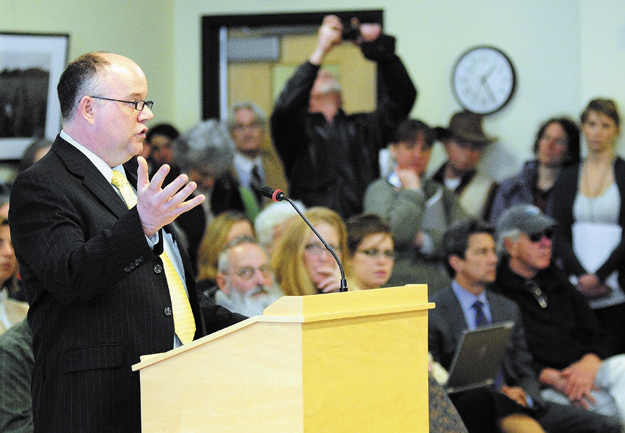AUGUSTA — With seven weeks to go in the legislative session, local lawmakers say they are gearing up for the final push as they continue to shepherd through bills that will have state and local consequences.
The statutory adjournment date is June 19, a somewhat fluid date that’s typically more of a target than a deadline. Legislative leaders last week allowed committees to schedule bills for public hearings faster than normal and gave them permission to meet extra days — even weekends — so they can get all bills out of committee by May 24.
The budget, bonds and a tax reform package are all major pieces of legislation that are still pending. In addition, hundreds of bills are in various stages of the legislative pipeline.
Some measures introduced earlier this year by local lawmakers already have earned initial approval, such as a bill sponsored by Rep. Craig Hickman, D-Winthrop, that directs the state to plant edible landscaping in Capitol Park. Hickman’s bill earned strong initial House approval and is headed to the Senate.
“I saw those green lights and I was happy,” Hickman said, noting the 107-33 vote on his bill, L.D. 474.
Hickman still is working on other pieces of legislation that seek to require state institutions to use more locally grown food, and measures to make Maine less dependent on food that comes from outside the state.
As a freshman lawmaker, Hickman said his first year has had its share of surprises.
“I constantly find myself surprised that so many lawmakers don’t read what they are voting on,” he said.
Rep. Lance Harvell, R-Farmington, is optimistic that one of the more controversial proposals of the session — a bill he’s sponsoring to require manufacturers to label foods that contain genetically modified organisms — will get a favorable committee recommendation.
The bill, L.D. 718, is on hold pending an opinion from Attorney General Janet Mills, who is examining the constitutionality of the measure. Some opponents argue that the bill violates constitutional provisions on interstate commerce that allow companies to avoid disclosing whether their products are genetically engineered.
“I think I’ve got a good shot,” Harvell said. “If (Mills) gives it even a neutral opinion, I think I can run the table. There’s a lot of support for it.”
Rep. Catherine Nadeau, D-Winslow, is a co-sponsor of a bill that has received little attention but would be a major change for forest rangers. Nadeau is backing a bill that would require them to receive training so they can be allowed to carry firearms as a way to protect themselves.
“The situations they are put in, it’s not the same situation as a decade ago,” she said. “We want them armed so they can come home at night. They are law enforcement.”
L.D. 297 received a strong vote of support from the Criminal Justice and Public Safety Committee, Nadeau said.
Lawmakers are awaiting a signal from Gov. Paul LePage to see whether he will sign L.D. 6, which would allow local school boards to override a city charter if they want to waive a residency requirement for superintendents. In Augusta, the local school board had difficulty finding qualified applicants who lived in Augusta or were willing to move here, so Rep. Matt Pouliot, R-Augusta, co-sponsored the measure to give the board flexibility in hiring.
Last week, LePage spokeswoman Adrienne Bennett said the governor had not decided whether he would veto the bill.
Sen. Christopher Johnson, D-Somerville, said he’s continuing to work on a bill that would bring more equity to the workers’ compensation system and other measures that would encourage energy efficiency. On Monday, he was presenting a bill to the Education and Cultural Affairs Committee that seeks to make it easier for schools to buy local food. Also, he’s a co-sponsor of Harvell’s GMO food-labeling bill.
“I believe strongly that labeling is a risk-management strategy for scientific uncertainty,” he said.
Rep. Deborah Sanderson, R-Chelsea, said a lot of bills still are pending in the Health and Human Services Committee, which will make for a busy month of May.
“When you’re talking about policy decisions that affect so many people, you can’t rush that,” she said.
One of those bills is a measure that would allow the state to ask the federal government for permission to prohibit those who receive food benefits from using them to buy junk food. It’s an effort supported by an unusual trio — LePage, Hickman and Sen. Roger Katz, R-Augusta.
Katz said the junk food issue has sparked a lot of Facebook debate, with most people expressing support. He’s also supportive of several other hot-button bills, including a proposed tax reform overhaul that would cut income taxes in half but expand the sales tax to hundreds of new items.
This week, he expects one of his two cellphone privacy bills to hit the Senate floor. One would prohibit police from using global positioning system technology from tracking people without a warrant and the other would prohibit police from accessing text messages or emails on cellphones without a warrant.
Next week, Katz’s bill to require the state to institute a different way of managing MaineCare patients will get a public hearing. Managed care has been used in other states successfully and has saved millions, he said.
His bill to sell the Gannett House on State Street for use as a museum got committee support, although in an amended form. The State and Local Government Committee voted to allow the state to offer the house for sale as a museum to any willing buyer, not just the Gannett family. Katz said given the work needed on the building, which is estimated at $1 million, and the requirement that it be used as a museum, the most likely bidder is the Gannett House Project.
“The project, I’m sure, will move ahead,” he said. “It’s very exciting.”
Susan Cover — 621-5643scover@mainetoday.com
Send questions/comments to the editors.



